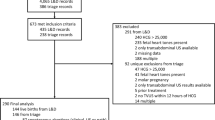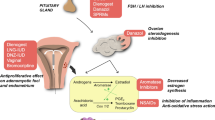Abstract
Purpose of Review
To provide an update on advances in medical management of early pregnancy loss, including the addition of mifepristone pretreatment to existing regimens.
Recent Findings
The utilization of misoprostol for medical management of early pregnancy loss has been studied extensively and is established as a safe and effective treatment. Two recent randomized controlled trials have demonstrated that the addition of mifepristone pretreatment significantly increases the effectiveness of misoprostol and a large body of data demonstrate the excellent safety profile of mifepristone. However, the Food and Drug Administration Risk Evaluation and Mitigation Strategy restrictions impose a major barrier to mifepristone use.
Summary
The addition of mifepristone to existing misoprostol regimens has significantly improved the effectiveness and patient-centered benefits of medical management of early pregnancy loss. Mifepristone restrictions need to be removed in order to decrease the barriers to women obtaining evidence-based care.
Similar content being viewed by others
References
Papers of particular interest, published recently, have been highlighted as: • Of importance •• Of major importance
ACOG Practice Bulletin No. 200. Summary: early pregnancy loss. Obstet Gynecol. 2018;132(5):1311–3.
Hemminki E. Treatment of miscarriage: current practice and rationale. Obstet Gynecol. 1998;91(2):247–53.
Wang X, Chen C, Wang L, Chen D, Guang W, French J. Conception, early pregnancy loss, and time to clinical pregnancy: a population-based prospective study. Fertil Steril. 2003;79(3):577–84.
Warburton D, Fraser FC. Spontaneous abortion risks in man: data from reproductive histories collected in a medical genetics unit. Am J Hum Genet. 1964;16:1–25.
Ventura SJ, Curtin SC, Abma JC, Henshaw SK. Estimated pregnancy rates and rates of pregnancy outcomes for the United States, 1990-2008. Natl Vital Stat Rep. 2012;60(7):1–21.
Trinder J, Brocklehurst P, Porter R, Read M, Vyas S, Smith L. Management of miscarriage: expectant, medical, or surgical? Results of randomised controlled trial (miscarriage treatment (MIST) trial). BMJ. 2006;332(7552):1235–40.
Henshaw RC, Cooper K, el-Refaey H, Smith NC, Templeton AA. Medical management of miscarriage: non-surgical uterine evacuation of incomplete and inevitable spontaneous abortion. BMJ. 1993;306(6882):894–5.
Chung TK, Cheung LP, Leung TY, Haines CJ, Chang AM. Misoprostol in the management of spontaneous abortion. Br J Obstet Gynaecol. 1995;102(10):832–5.
Committee on Practice B-G. The American College of Obstetricians and Gynecologists Practice Bulletin no. 150. Early pregnancy loss. Obstet Gynecol. 2015;125(5):1258–67.
Chen BA, Creinin MD. Contemporary management of early pregnancy failure. Clin Obstet Gynecol. 2007;50(1):67–88.
Zhang J, Gilles JM, Barnhart K, Creinin MD, Westhoff C, Frederick MM, et al. A comparison of medical management with misoprostol and surgical management for early pregnancy failure. N Engl J Med. 2005;353(8):761–9.
Robledo C, Zhang J, Troendle J, Barnhart K, Creinin MD, Westhoff C, et al. Clinical indicators for success of misoprostol treatment after early pregnancy failure. Int J Gynaecol Obstet. 2007;99(1):46–51.
Schreiber CA, Creinin MD, Reeves MF, Harwood BJ. Mifepristone and misoprostol for the treatment of early pregnancy failure: a pilot clinical trial. Contraception. 2006;74(6):458–62.
Kollitz KM, Meyn LA, Lohr PA, Creinin MD. Mifepristone and misoprostol for early pregnancy failure: a cohort analysis. Am J Obstet Gynecol. 2011;204(5):386 e1–6.
Neilson JP, Hickey M, Vazquez J. Medical treatment for early fetal death (less than 24 weeks). Cochrane Database Syst Rev. 2006;3:CD002253.
Neilson JP, Gyte GM, Hickey M, Vazquez JC, Dou L. Medical treatments for incomplete miscarriage. Cochrane Database Syst Rev. 2013;3:CD007223.
• Lemmers M, Verschoor MA, Kim BV, Hickey M, Vazquez JC, Mol BWJ, et al. Medical treatment for early fetal death (less than 24 weeks). Cochrane Database Syst Rev. 2019;6:CD002253 This systematic review reported similar effectiveness for various routes of misoprostol administration.
Petrou S, McIntosh E. Women's preferences for attributes of first-trimester miscarriage management: a stated preference discrete-choice experiment. Value Health. 2009;12(4):551–9.
Creinin MD, Schwartz JL, Guido RS, Pymar HC. Early pregnancy failure--current management concepts. Obstet Gynecol Surv. 2001;56(2):105–13.
• Al Wattar BH, Murugesu N, Tobias A, Zamora J, Khan KS. Management of first-trimester miscarriage: a systematic review and network meta-analysis. Hum Reprod Update. 2019;25(3):362–74 This systematic review and meta-analysis concludes that mifepristone may improve the efffectiveness of existing misoprostol regimens. They call for further researh to help improve inconsistencies between current studies.
Gemzell-Danielsson K, Bygdeman M, Aronsson A. Studies on uterine contractility following mifepristone and various routes of misoprostol. Contraception. 2006;74(1):31–5.
Fiala C, Gemzel-Danielsson K. Review of medical abortion using mifepristone in combination with a prostaglandin analogue. Contraception. 2006;74(1):66–86.
Baulieu EE. The steroid hormone antagonist RU486. Mechanism at the cellular level and clinical applications. Endocrinol Metab Clin N Am. 1991;20(4):873–91.
Baulieu EE. On the mechanism of action of RU486. Ann N Y Acad Sci. 1991;626:545–60.
Schreiber CA, Creinin MD, Harwood B, Murthy AS. A pilot study of mifepristone and misoprostol administered at the same time for abortion in women with gestation from 50 to 63 days. Contraception. 2005;71(6):447–50.
Duan H, Wang NG. Effects of tyrosine alone and tyrosine in combination with RU486 on early pregnancy in mice and the mechanism of action. Yao Xue Xue Bao. 1997;32(8):583–5.
Cheng L, Kelly RW, Thong KJ, Hume R, Baird DT. The effect of mifepristone (RU486) on the immunohistochemical distribution of prostaglandin E and its metabolite in decidual and chorionic tissue in early pregnancy. J Clin Endocrinol Metab. 1993;77(3):873–7.
Creinin MD, Fox MC, Teal S, Chen A, Schaff EA, Meyn LA, et al. A randomized comparison of misoprostol 6 to 8 hours versus 24 hours after mifepristone for abortion. Obstet Gynecol. 2004;103(5 Pt 1):851–9.
Creinin MD, Schreiber CA, Bednarek P, Lintu H, Wagner MS, Meyn LA, et al. Mifepristone and misoprostol administered simultaneously versus 24 hours apart for abortion: a randomized controlled trial. Obstet Gynecol. 2007;109(4):885–94.
Schreiber C, Creinin M. Mifepristone in abortion care. Semin Reprod Med. 2005;23(1):82–91.
Schaff EA, Fielding SL, Westhoff C, Ellertson C, Eisinger SH, Stadalius LS, et al. Vaginal misoprostol administered 1, 2, or 3 days after mifepristone for early medical abortion: a randomized trial. JAMA. 2000;284(15):1948–53.
van den Berg J, Gordon BB, Snijders MP, Vandenbussche FP, Coppus SF. The added value of mifepristone to non-surgical treatment regimens for uterine evacuation in case of early pregnancy failure: a systematic review of the literature. Eur J Obstet Gynecol Reprod Biol. 2015;195:18–26.
•• Schreiber CA, Creinin MD, Atrio J, Sonalkar S, Ratcliffe SJ, Barnhart KT. Mifepristone pretreatment for the medical management of early pregnancy loss. N Engl J Med. 2018;378(23):2161–70 This randomized controlled trial demonstrated signifcantly increased rates of complete uterine evacuation and decreased rates of uterine aspiration for the addition of mifepristone to misoprostol.
•• Sinha P, Suneja A, Guleria K, Aggarwal R, Vaid NB. Comparison of mifepristone followed by misoprostol with misoprostol alone for treatment of early pregnancy failure: a randomized double-blind placebo-controlled trial. J Obstet Gynaecol India. 2018;68(1):39–44 This randomized controlled trial showed that mifepristone pretreatment to misoprostol significantly improves the efficay of misoprostol alone.
Rausch M, Lorch S, Chung K, Frederick M, Zhang J, Barnhart K. A cost-effectiveness analysis of surgical versus medical management of early pregnancy loss. Fertil Steril. 2012;97(2):355–60.
Dalton VK, Liang A, Hutton DW, Zochowski MK, Fendrick AM. Beyond usual care: the economic consequences of expanding treatment options in early pregnancy loss. Am J Obstet Gynecol. 2015;212(2):177 e1–6.
Nagendra D, Schreiber CA, Koelper N, Sonalkar S, Loza-Avalos S, Harvie H. Cost effectiveness of mifepristone pretreatment for the medical management of nonviable early pregnancy [09OP]. Obstet Gynecol. 2019;133:6.
Westhoff CL. A better medical regimen for the management of miscarriage. N Engl J Med. 2018;378(23):2232–3.
Kulier R, Kapp N, Gulmezoglu AM, Hofmeyr GJ, Cheng L, Campana A. Medical methods for first trimester abortion. Cochrane Database Syst Rev. 2011;11:CD002855.
American College of O, Gynecologists. Practice bulletin no. 143: medical management of first-trimester abortion. Obstet Gynecol. 2014;123(3):676–92.
Henney JE, Gayle HD. Time to reevaluate U.S. mifepristone restrictions. N Engl J Med. 2019;381(7):597–8.
Mifeprex RSG, Raymond EG, Blanchard K, Blumenthal PD, Cleland K, Foster AM, et al. Sixteen years of overregulation: time to unburden Mifeprex. N Engl J Med. 2017;376(8):790–4.
Cleland K, Smith N. Aligning mifepristone regulation with evidence: driving policy change using 15 years of excellent safety data. Contraception. 2015;92(3):179–81.
Pymar HC, Creinin MD, Schwartz JL. Mifepristone followed on the same day by vaginal misoprostol for early abortion. Contraception. 2001;64(2):87–92.
Rossi B, Creinin MD, Meyn LA. Ability of the clinician and patient to predict the outcome of mifepristone and misoprostol medical abortion. Contraception. 2004;70(4):313–7.
Author information
Authors and Affiliations
Corresponding author
Ethics declarations
Conflict of Interest
CAS is a consultant for Danco Laboratories, LLC. The Department of Obstetrics and Gynecology, University of Pennsylvania, receives contraceptive research funding from the NIH, the Society of Family Planning, Bayer, Daré, FHI360, Medicines360, and Sebela. In addition, Dr. Schreiber has a patent 62/777,369 pending.
Human and Animal Rights
This article does not contain any studies with human or animal subjects performed by any of the authors.
Additional information
Publisher’s Note
Springer Nature remains neutral with regard to jurisdictional claims in published maps and institutional affiliations.
This article is part of the Topical Collection on Family Planning
Rights and permissions
About this article
Cite this article
Shorter, J.M., Schreiber, C.A. & Sonalkar, S. Recent Advances in the Medical Management of Early Pregnancy Loss. Curr Obstet Gynecol Rep 9, 60–65 (2020). https://doi.org/10.1007/s13669-020-00282-0
Published:
Issue Date:
DOI: https://doi.org/10.1007/s13669-020-00282-0




